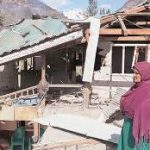UNGA asks Israel to Withdraw From Occupied Territories in Gaza

This is in keeping with the growing isolation of Israel on the world stage, as the UN General Assembly voted to demand Israel to withdraw its forces from occupied Palestinian territories within one year.
The non-binding resolution by the General Assembly comes after an advisory ruling in July by the International Court of Justice-also known as the World Court pursuant to which Israel was called upon to terminate its “unlawful presence” in the territories and to “immediately cease” all settlement activities.
In the plenary session, which was held in the General Assembly Hall of the United Nations headquarters in New York, the resolution was finally adopted: 124 in favor, 14 against and 43 abstentions.
The General Assembly has adopted a number of resolutions critical of Israel, including two recently since the fighting started on October 7, but this is the first since 1982 that calls for punitive measures against Israel. The resolution assumes added importance because it aims to implement a decision of the ICJ, which pronounced “Israel’s security concerns cannot override the prohibition against the acquisition of territory by force.”
This resolution is also the first put forward by Palestine since the UN General Assembly voted in May to upgrade Palestine’s UN observer status, enabling its delegation to sponsor resolutions. That vote came after the U.S. vetoed the UN Security Council, blocking Palestine’s application for full UN membership.
The resolution calls on member states to prevent the importation of products from Israeli settlements, and to end arms transfers to Israel if they suspect such equipment could be used in the occupied territories. It also calls for UN Secretary-General António Guterres to report within three months on efforts to encourage Israeli cooperation.
Although the United States has no veto power in the General Assembly, it lobbied its allies to reduce the number of votes against Israel in a resolution which asked Israel to withdraw from Gaza. The resolution does not carry legal force, and in Israel, it is likely to reinforce a belief that the UN is hostile to the country.
It voted in October to demand more access to Gaza for humanitarian aid by 120 to 14 with 45 abstentions. In December, the General Assembly called for an immediate ceasefire by 153 votes to 10 with 23 abstentions.
On the other hand, U.S. Ambassador to the UN Linda Thomas-Greenfield objected to the new resolution for the same reasons it was one-sided and selectively interpreted the opinion of the ICJ. She also argued it did not further the goal of two states living in peace and failed to condemn Hamas as a terrorist organization.
During the debate, Egypt’s representative Osama Mahmoud Abdelkhalek Mahmoud expressed frustration with the protection that the U.S. gives Israel from international legal and political judgments. He said Israel’s occupation and settlements, along with its extremist settlers, would not be tenable if countries upholding the rule of international law and this ruling of the ICJ made up their minds to cut ties with Israel.
He underscored that the end of occupation and restriction of Israel’s aggressions against the Palestinians are among the most important priorities needed to maintain international security and regional stability. He condemned Israel against its actions against the UN, accusing it of killing over 220 staff members of the UN, besides criminalizing UNRWA by labeling it a terrorist organization.







Comments